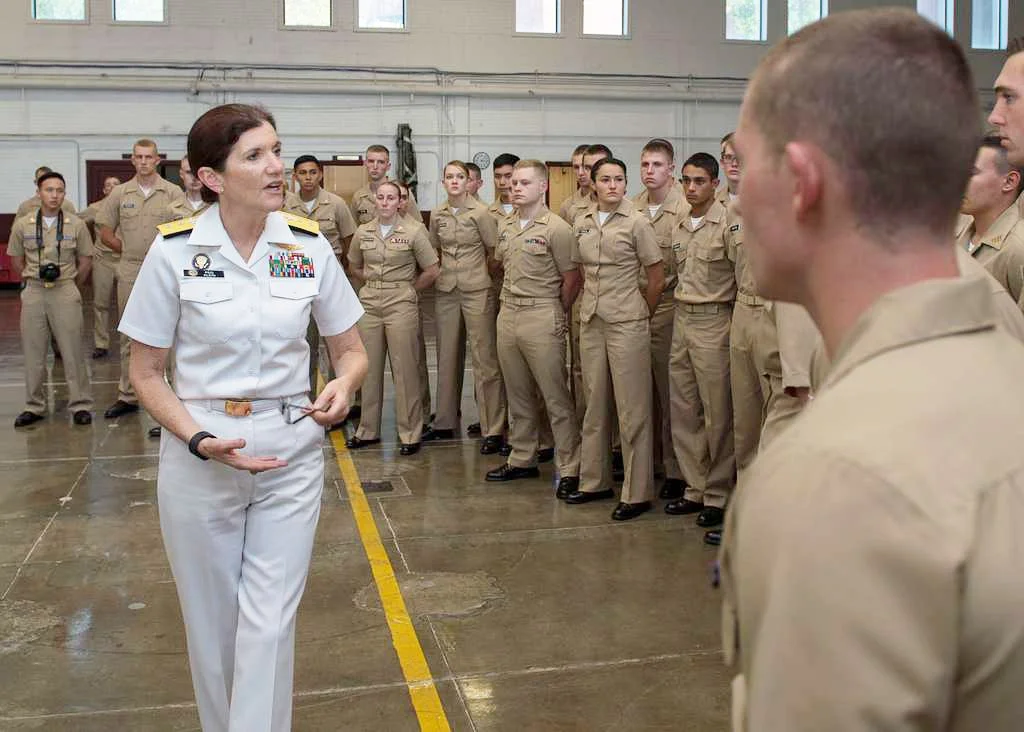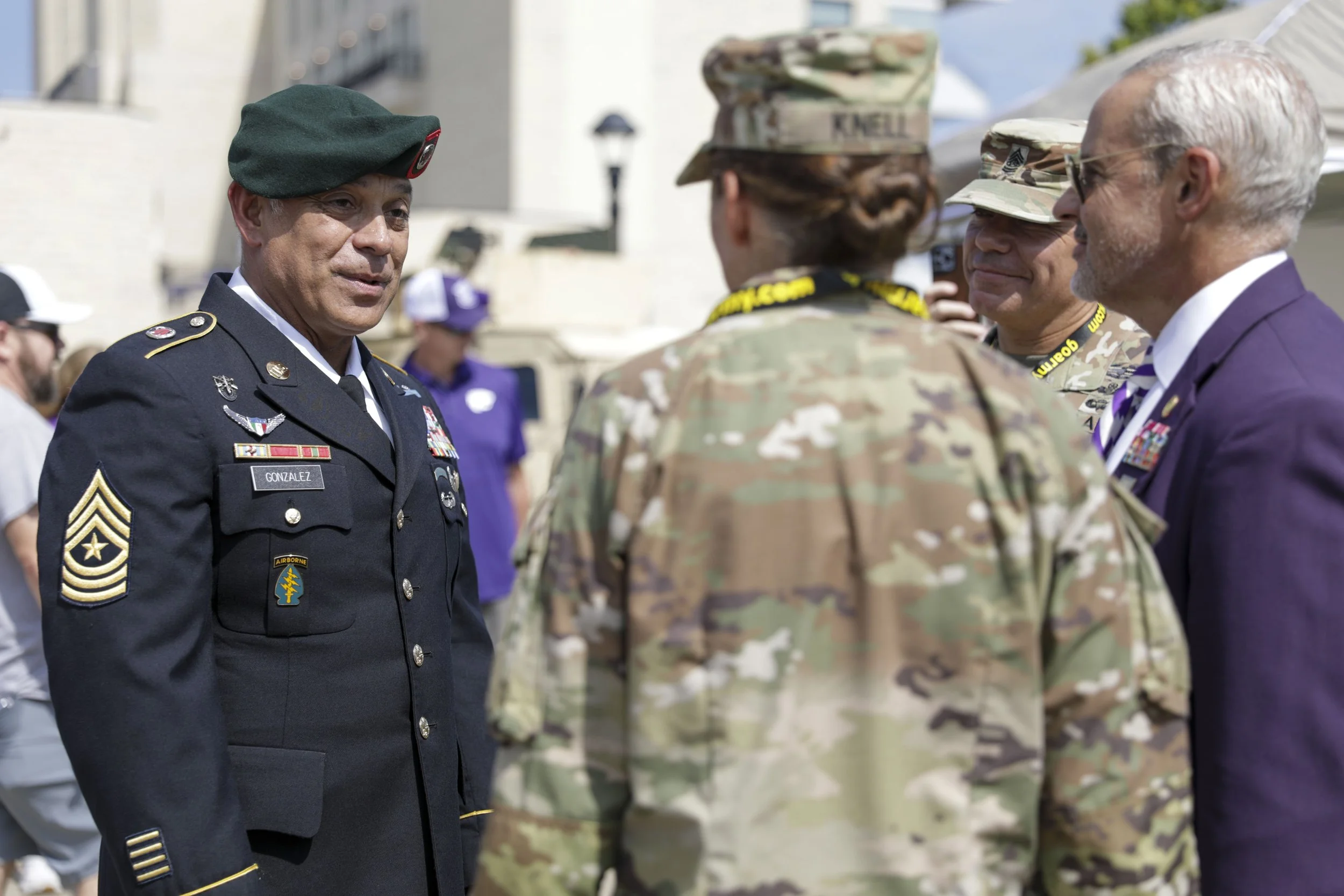Rear admiral Peg Klein anchors virtue and ethics at the center of decision-making
RADM Peg Klein ’81, USN (Ret.), was the first woman to serve as commandant at the Naval Academy. She also served as senior adviser for military professionalism to the Secretary of Defense, and chief of staff for U.S. Cyber Command.
Raised near Naval Air Station South Weymouth outside of Boston, MA, Rear Admiral Peg Klein ’81, USN (Ret.), developed a passion for aviation at an early age. Her father, a professor of aviation science and a Navy reservist, frequently took Klein flying.
“I remember when my dad got his private pilot’s license,” Klein said. “I would look over his shoulder while he was studying for ground school. I waited for him at the airfield while he took flight lessons. The first time he flew me over Cape Cod, it was thrilling. I loved being in the air. I loved what you could see from the air.”
Her father’s love for the Navy through his service as a Navy Reservist inspired Klein to pursue aviation. As a Blue and Gold Officer, he knew all about the Naval Academy, but women weren’t admitted to service academies when Klein graduated from high school. She visited with a Navy recruiter who attempted to steer her toward nursing, but Klein remained focused on aviation.
She enrolled at a Penn State branch campus and applied for an ROTC scholarship. Then, her father sent her a news article covering the law signed by President Gerald Ford in October 1975 that women would be admitted to the all-male military colleges. An injury prevented her from passing the entrance physical to be part of the first class of women, but in 1977 Klein was admitted as part of the Academy’s second class of women.
“I was aware enough that I knew my vision was not going to allow me to be a pilot,” Klein said. “I knew I wanted to do something with aviation and that the Navy offered lots of opportunities in aviation. So, I jumped into the deep end of the pool and said, ‘I’ll figure it out.’ It was a total act of faith.”
Klein studied oceanography at the Academy, another passion. All the while, flying remained in the back of her mind. By 1979, women began to commission as naval flight officers and Klein found her path forward in aviation. She would serve almost 36 years on active duty as a naval flight officer holding several prestigious positions, including the first woman Commandant of Midshipmen, senior adviser for military professionalism to the Secretary of Defense, chief of staff for U.S. Cyber Command and director of global operations for the Navy’s Network Warfare Command.
Now, Klein is dean of the College of Leadership and Ethics at the U.S. Naval War College in Newport, RI. In every leadership position she’s held throughout her career, Klein has harkened back to her time at the Academy where she learned the value of integrity in leadership.
“In our second class and first class years, we met with a number of former prisoners of war who would visit the Naval Academy,” Klein said. “We had the chance to listen and interact with them. They were the first people to put an imprint on us about virtue, about what helped them survive as prisoners of war.
“It really shaped our thinking because they spent time with us. From then on, I became more aware of the officers leading around me. As a young officer, I aligned myself with the folks who led ethically. The difference between average officers and outstanding officers is leading ethically and living by the core values of honor, courage and commitment.”
Klein has always remembered those former prisoners of war and how virtue and philosophy helped them survive their imprisonment. Over the years, she’s worked to make the Navy—a very technically focused organization—anchor virtue and ethics at the center of decision-making.
At the Naval War College, Klein teaches courses on professionalism and ethics. Every Monday, she sends a weekly message focusing on inspirational aspects of leadership to a list of 1,000 people who forward it to thousands more. The list originated when she was working at the Pentagon under Secretary Chuck Hagel, but a commitment to inspirational leadership was evident in Klein as a midshipman.
“I never would have made it through Plebe Summer if Peg had not been my roommate,” said Captain Joan Skellenger Platz ’81, USN (Ret.). “She was so mature and familiar with the Navy. She was much more prepared for the Academy than I was. She never gave up on supporting me, regardless of how poorly I did. She remains the same amazing friend to me today.”
Praised for her unrelenting moral toughness and courage and her uncompromising and resolute character, Klein has served as friend and mentor to many. Her service to others and to the Navy has been a constant throughout her life. She’s a member of the board of directors for the U.S. Naval Institute, a past Athletic and Scholarship Programs trustee and delivered the keynote address at the 2020 U.S. Naval Academy Alumni Association and Foundation Leadership Conference.
“Peg approaches every aspect of her life with honor, courage, commitment and loyalty,” Platz said. “She is the consummate professional both while serving on active duty and in her civilian service to the Navy. Peg gives her all to everything she does, and she does it all with grace and dignity.”
Klein and her husband, Commander Frank Klein ’79, USN (Ret.), met at the Academy the day before Frank’s graduation ceremony. The couple was married while Peg was in flight training. They have two children, a son who works for the Department of the Navy as a civilian and a daughter who is a nurse.
Klein didn’t set out to be a trailblazer, she merely embraced her parents’ outlook that she should live a life without limits. In doing so, she achieved many firsts for women. In addition to serving as the first woman Commandant of Midshipmen (2006-08), she was one of the first women naval flight officers and went on to lead an air-reconnaissance squadron and wing. She also was the first woman named an information warfare commander on the KITTY HAWK strike group.
“Frank and I made a commitment to ourselves that every time we received new orders there were two criteria: Could we stay together? And are we still having fun?” Klein said. “If those criteria were met, we would continue our service. Frank served for 20 years and I stayed in for 36.
“I joined the Navy to be able to fly, but I stayed because of the extraordinary people. I worked for some incredible leaders who cared for me and advocated for me, and I’ve always felt it was my duty to do the same for the people who work for me.”
Although she didn’t set out to have a career in the military, achieving the rank of rear admiral and serving as the senior advisor for military professionalism to the secretary of defense gave Klein an opportunity to help shape the military’s approach to ethics, character and leadership within an uncompromising culture of accountability. In recognition of her service, she was awarded the Defense Distinguished Service Medal.
“I very much appreciate whoever said, ‘Nobody will remember what you said, but they will remember how you made them feel,’” Klein said. “I hope the people I’ve worked with, and certainly the people who’ve worked for me, understand that how you lead makes a difference. We should always pay attention to how we lead and not just the results we accomplish. Leading with dignity and respect is a really valuable way to lead.”
This story appeared in the October 2022 issue of Shipmate magazine.












